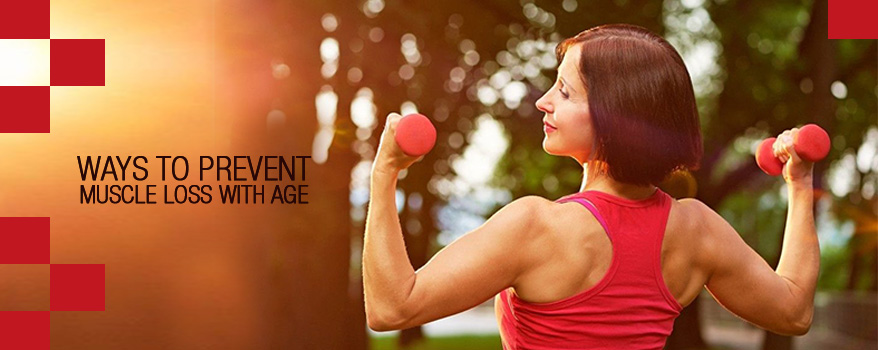Aging is a normal part of life. It is a fact that your body composition changes as you get older. Loss of muscle mass that occurs with aging is known as Sarcopenia. This can lead to low muscle strength and power, problems with balance and mobility, and decreased levels of activity. Muscles mass helps to keep your metabolic system intact and protects against obesity, diabetes, heart disease etc. It is necessary to maintain muscle mass for this reason. However the good news is, by making some changes to your diet and lifestyle age-related muscle loss can be prevented to a great extent. Read on to know how to prevent muscle loss with age.
Increase Protein Intake
When it comes to muscle development protein plays a very important role. Studies have shown that People who increased their protein consumption experienced an increase in muscle protein synthesis, the process by which your cells use protein to build more muscle. 25- 30 grams of protein in each meal helps you prevent age-related muscle loss. Fish or seafood, Lentils and beans, Meats like beef, lamb, or pork, Eggs, Nuts, Milk, yogurt, cheese, and other dairy products are some foods that will boost your protein intake.
Exercise
Exercise is vital in preventing muscle loss. The right food along with proper physical activity can do wonders to your body. Retaining muscle tone and curbing age-related muscle loss needs both regular aerobic and resistance exercise. Strength exercises are also known for their favorable effect on increasing and maintaining muscle mass. Cardiovascular exercise, weight training and Yoga are vital because they consistently activate and signal the muscles to grow.
Sleep
Working out is beneficial for your health. However it is necessary to give rest to your body as it needs time to regenerate itself. This regeneration happens while you sleep, so try to get at least 7 to 8 hours of sleep each night. This would help you reduce the muscle loss and keep you healthy and strong.
Strengthen Your Muscles with Vitamin D
Your body needs vitamin D to maintain muscle strength. A lack of vitamin D can affect your body’s ability to build muscle. Age itself can lead you to a lack of vitamin D. Make sure to get enough vitamin D through fortified milk, orange juice, cereals, fatty fish like salmon and mackerel, beef liver or egg yolks.
Control Other Illnesses to stop age-related Muscle Loss
Age-related muscle loss is more widespread in those with conditions like Obesity, Osteoporosis, Osteopenia, Type-2 diabetes, and Breast cancer compared to normal healthy individuals. Hence preventing or controlling the other health condition may help slow down muscle loss.
Muscle loss is a natural effect associated with aging. A healthy and active 60 year old can have the muscle mass of a 30-year old, while an inactive middle-aged person who eats a primarily processed food diet and struggles with insulin resistance or diabetes may have the muscle quality of a 70-year old. Muscle aging may start at a relatively young age. By the time you’re in your 30s, age-related muscle loss may already have begun. So why not take proactive steps to prevent it and lead healthy life.

